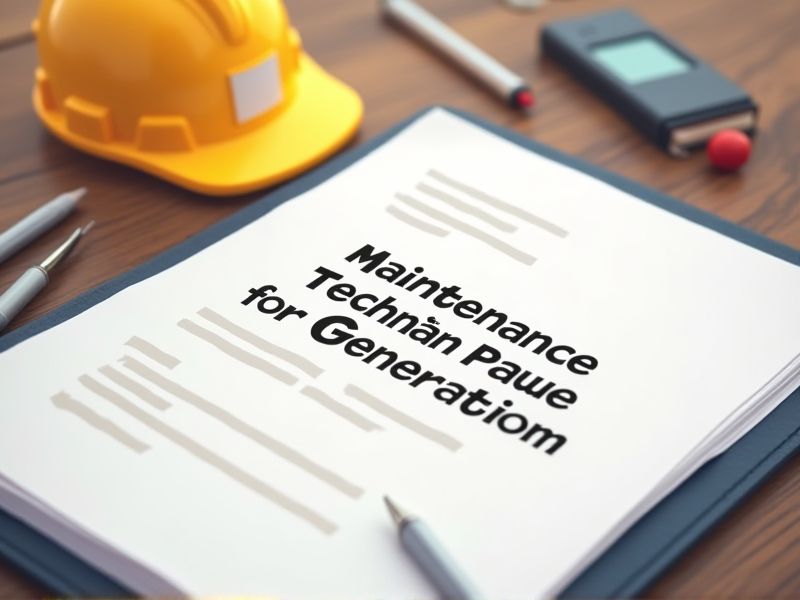
Maintenance Technicians in Power Generation are responsible for ensuring the efficient and safe operation of critical systems, demanding a specialized skill set. Certifications validate expertise in areas such as electrical systems, mechanical systems, and safety protocols, which are essential for maintaining operational integrity and preventing costly downtime. Employers prioritize certified technicians as they minimize risks associated with equipment failure and enhance compliance with industry standards. Important certifications for a Maintenance Technician in Power Generation include the following.
OSHA 30-Hour General Industry Certification
Obtaining an OSHA 30-Hour General Industry Certification equips maintenance technicians with essential safety knowledge, crucial for navigating the inherent hazards of power generation facilities. This training aligns with regulatory compliance standards, minimizing the potential for workplace accidents and costly violations. Enhanced safety practices lead to improved operational efficiency and reduced downtime, as technicians are better prepared to handle equipment safely and effectively. Certification also underscores a technician's commitment to safety, potentially boosting career prospects and organizational trust.
Lockout/Tagout (LOTO) Certification
Lockout/Tagout (LOTO) Certification ensures that maintenance technicians understand and implement safety protocols to prevent hazardous energy releases during equipment service. This certification reduces the risk of accidental injuries or fatalities, which is particularly crucial in power generation environments due to high-energy equipment. Compliance with LOTO procedures is mandated by OSHA regulations, necessitating certification for legal and safety standards. Instituting LOTO practices leads to a safer workplace, minimizing downtime caused by accidents.
Confined Space Entry Certification
Confined Space Entry Certification is essential for maintenance technicians in power generation because confined spaces often contain hazardous atmospheres that can lead to severe health risks or fatalities. The certification provides technicians with the necessary skills to identify potential dangers such as toxic gases, which helps in minimizing safety incidents. Regulatory bodies mandate this certification to ensure compliance with safety standards and reduce legal liabilities. Proper training and certification enhance operational efficiency by equipping technicians to perform tasks safely and effectively within confined environments.
First Aid/CPR Certification
First Aid/CPR certification equips maintenance technicians in power generation with the skills to respond immediately to electrical injuries and associated hazards, minimizing downtime. This certification enhances workplace safety by ensuring technicians can provide critical first response care to colleagues in high-risk environments. Understanding CPR techniques can significantly increase survival rates during emergencies, which is crucial in isolated facilities where medical aid might be delayed. Certified technicians contribute to a safety-focused culture, reducing liability risks for power generation companies.
Certified Maintenance & Reliability Technician (CMRT)
The CMRT certification ensures that maintenance technicians possess the necessary skills and knowledge specific to power generation systems. It creates a standardized level of competency, leading to more efficient and effective maintenance practices. With certified professionals, power generation plants experience reduced downtime and improved system reliability. The CMRT credential enhances the technician's credibility and can lead to career advancement opportunities.
Electrical Maintenance Certification
Obtaining an Electrical Maintenance Certification ensures that maintenance technicians have the necessary skills and knowledge to work safely and efficiently on electrical systems in power generation. This certification helps in reducing the risk of accidents and equipment failures, which can lead to downtime and increased operational costs. The certification supports compliance with industry standards and regulations, ensuring that technicians adhere to legal requirements. It enhances the credibility and employability of technicians, as employers prioritize hiring certified professionals to maintain the reliability of power generation facilities.
Power Plant Operator Certification
Certification validates technical expertise, ensuring that maintenance technicians possess the required knowledge to operate complex power generation systems safely. Safety standards and regulatory compliance become more stringent in the energy sector, making certification critical for meeting legal requirements. Certified technicians demonstrate proficiency, which reduces operational risks and equipment failures, thereby enhancing reliability and performance. Energy companies often prefer certified professionals to optimize preventive maintenance and minimize downtime.
Instrumentation & Control Systems Certification
Gaining a certification in Instrumentation & Control Systems enables a maintenance technician to effectively manage complex systems within power generation facilities. This expertise reduces system downtime by improving both troubleshooting and routine maintenance processes. Certification enhances the technician's understanding of sensor and actuator functionalities, crucial for maintaining system efficiency. Companies may gain competitive advantages from employing certified technicians, as this can lead to improved safety and operational precision within the power plant.
Industrial Machinery Maintenance Certification
Industrial machinery maintenance certification ensures that technicians possess the necessary skills to maintain and repair power generation equipment effectively. Proper certification reduces downtime by enabling technicians to quickly identify and resolve issues, thereby increasing operational efficiency. Certified technicians adhere to industry safety standards, minimizing the risk of accidents and equipment failures. Certification also enhances career prospects by validating a technician's expertise in maintaining complex machinery specific to power generation.
Welding Certification (AWS D1.1)
Welding Certification (AWS D1.1) ensures that a Maintenance Technician possesses the necessary skills and knowledge to perform welding tasks safely and effectively in power generation facilities. Certified technicians are more proficient in creating durable and reliable welds, which minimizes the risk of equipment failure and enhances operational efficiency. The certification also demonstrates adherence to recognized industry standards, reducing potential legal and compliance issues for the employer. Investing in certified technicians enhances the overall safety and longevity of power generation systems due to their ability to execute high-quality welds under varying conditions.
Summary
You, as a Maintenance Technician in Power Generation, can expect enhanced career opportunities after acquiring relevant certifications. The certifications can improve your technical expertise, making you a more valuable asset to employers. With these credentials, you might secure higher pay and greater job stability. Employers often prefer certified technicians, which could further boost your professional reputation within the industry.
